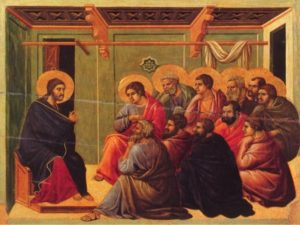Where Hell Begins (Part 3)
Ever notice that everything in the Our Father is sandwiched between the reality of a God who wishes to be known and loved as a Father and the need for forgiveness, both from Him and between ourselves?
 On account of the entire motive behind the Incarnation – a motive articulated by God in Eden – Christ is emphatic about our need to forgive. Forgive us our debts as we forgive, a comparative petition, with the assurance of grace to bear temptations and deliverance from evil as the reward (Mt. 6:12).
On account of the entire motive behind the Incarnation – a motive articulated by God in Eden – Christ is emphatic about our need to forgive. Forgive us our debts as we forgive, a comparative petition, with the assurance of grace to bear temptations and deliverance from evil as the reward (Mt. 6:12).
The fate of the unjust steward who would not forgive should send up a high warning flag (Mt. 18:23 ff.). Seventy times seven does He answer Peter’s question about how often to forgive.
This is all because, as God is interested in ending hell in our lives, we – quite to the contrary – can make other people’s lives hell by not forgiving, by holding out on them, by refusing to extend an olive branch when able, by holding grudges, by giving the silent treatment, or by not expressing sorrow when we are at fault.
 Perhaps we set the bar too high for others who have wronged us, failing to acknowledge clumsy yet genuine efforts made to change, refusing to heed the example of the Good Samaritan who walks with the wounded; this often happens between spouses. Christ instituted the Sacrament of Confession, not only for us to have the spiritual benefit of knowing we are forgiven by God for our sins, but also for the psychological benefit of hearing the words I forgive you.
Perhaps we set the bar too high for others who have wronged us, failing to acknowledge clumsy yet genuine efforts made to change, refusing to heed the example of the Good Samaritan who walks with the wounded; this often happens between spouses. Christ instituted the Sacrament of Confession, not only for us to have the spiritual benefit of knowing we are forgiven by God for our sins, but also for the psychological benefit of hearing the words I forgive you.
Those words are crucial for the healing process in any fractured or ruptured relationship, and scar tissue is far preferable to an open wound, mindful that it is stronger than the skin it replaces. (And don’t worry, God will take care of any cosmetic surgery that is needed for scars.)
Understand how the angel on Easter morning instructs Magdalene to go tell the others and Peter that our Lord is risen (cf. Mk. 16:7).
 Peter is not singled out here just because he is the prince of the Apostles; it is likely more because Peter had denied our Lord three times, leaving him in a very uncertain and hellish state of existence of where he stood with Christ. Our Lord wished to begin relieving that burden Peter carried so deeply within, even before He appeared risen to them.
Peter is not singled out here just because he is the prince of the Apostles; it is likely more because Peter had denied our Lord three times, leaving him in a very uncertain and hellish state of existence of where he stood with Christ. Our Lord wished to begin relieving that burden Peter carried so deeply within, even before He appeared risen to them.
And upon that appearance, Christ wishes them all peace – something most foreign to hell – and gives them the power to forgive sin (Jn. 20:19 ff.). Behold again the motive of the Redeemer announced in Eden. End the hell.
No wonder then that those who have the strongest and most durable faith, be it today or yesteryear or among the canonized saints through the ages, are those who have profoundly realized the forgiveness they have received from God, be it experienced through the confessional with a hand raised in absolution, or through a hand held out in peace from someone they had grieved.
Such forgiveness brings with it a life and love that can only come from God. The clouds clear, creating some heaven here amidst the hell all around us.
 Forgiveness fulfills St. Paul’s exhortation to bear one another’s burdens (Gal. 6:2). It amounts to sharing in the burden God took upon Himself in Eden, manifested in Bethlehem, fulfilled on Calvary. It means taking the risk of what comes with a true relationship with God that is consequent of such forgiveness, loving our neighbor as ourselves, discarding the sham of being “spiritual,” the horror of being hidden from God, and finding contentment to live and suffer with Him.
Forgiveness fulfills St. Paul’s exhortation to bear one another’s burdens (Gal. 6:2). It amounts to sharing in the burden God took upon Himself in Eden, manifested in Bethlehem, fulfilled on Calvary. It means taking the risk of what comes with a true relationship with God that is consequent of such forgiveness, loving our neighbor as ourselves, discarding the sham of being “spiritual,” the horror of being hidden from God, and finding contentment to live and suffer with Him.
Forgiveness trades our wounds for the open wound of Christ’s Heart, and that is the place where heaven begins.
December 18, 2020








